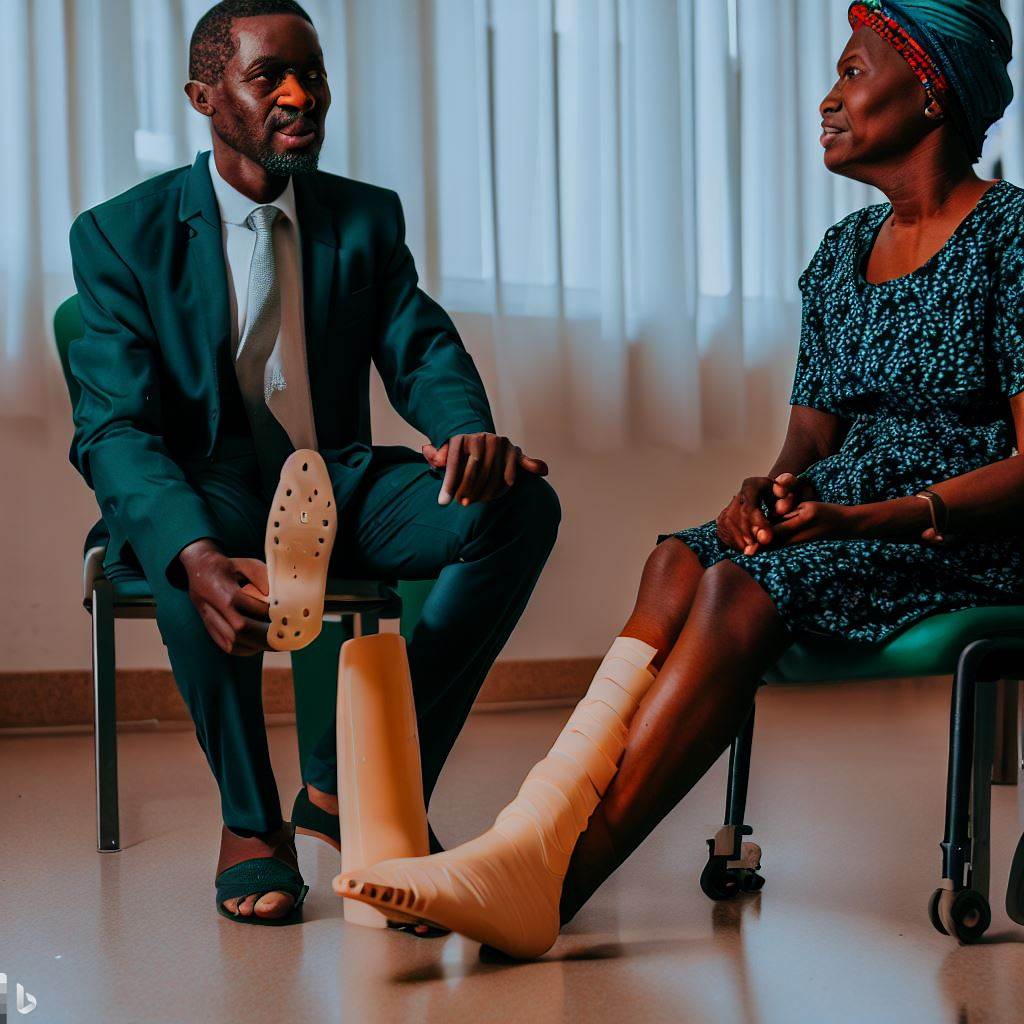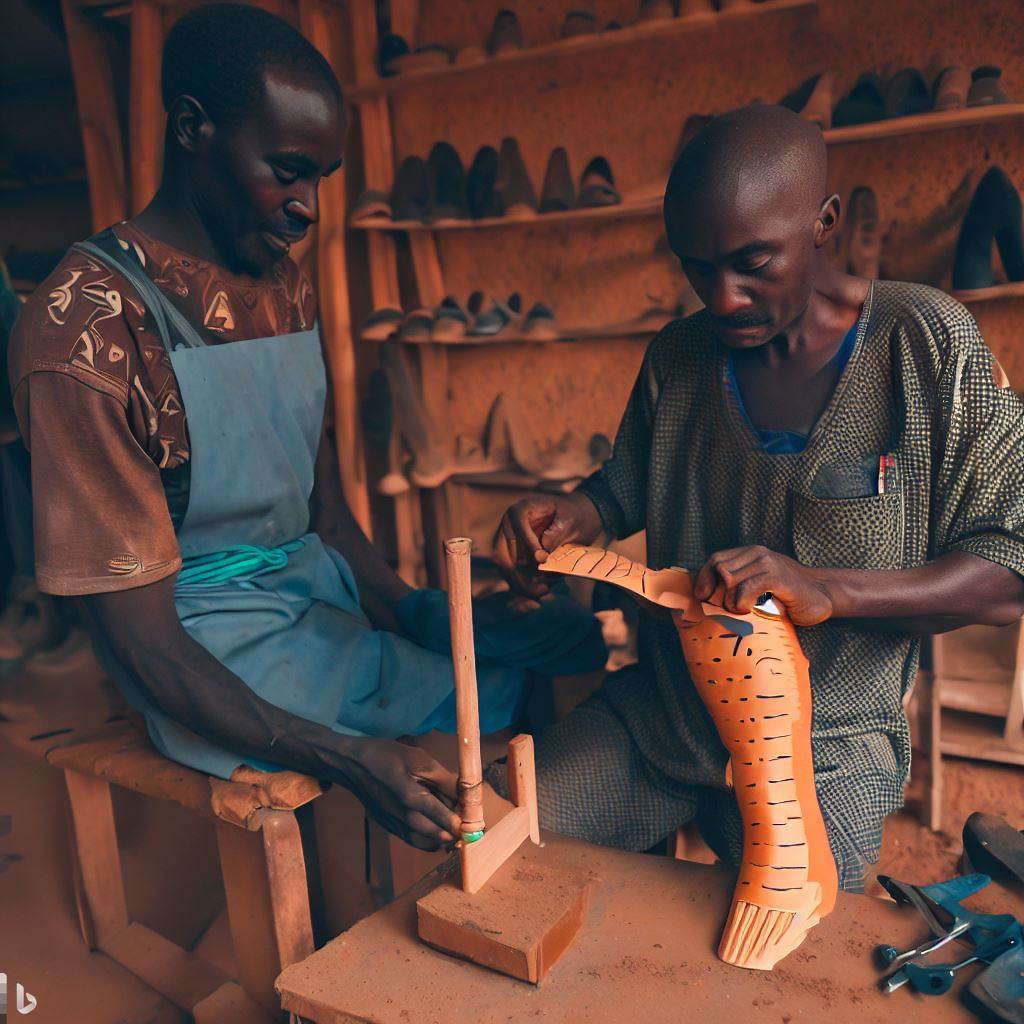Introduction
The role of the government in orthotic and prosthetic care in Nigeria is a significant topic that needs addressing in the context of the country’s healthcare system.
In this blog post, we will explore the importance of government involvement and regulations in orthotic and prosthetic care.
Specifically, we will discuss the need for proper government support and funding, the establishment of quality standards and regulations, and the accessibility of these services to all Nigerians.
By examining these issues, we can gain a better understanding of the impact of government policies on orthotic and prosthetic care in Nigeria, and identify areas that require improvement.
Overview of Orthotic and Prosthetic Care in Nigeria
In this section, we will explore the field of orthotics and prosthetics and its critical importance in healthcare.
Additionally, we will provide an overview of the current state of orthotic and prosthetic care in Nigeria.
Highlighting the challenges and limitations faced by patients, practitioners, and the healthcare system in delivering these services.
The Field of Orthotics and Prosthetics
Orthotics and prosthetics involve the design, fabrication, and fitting of medical devices that support or replace limbs and various body segments.
This field plays a crucial role in improving the quality of life for individuals with physical disabilities.
By providing orthotic and prosthetic devices, such as braces, artificial limbs, and other supportive equipment, individuals can regain mobility, functionality, and independence.
These devices assist patients in performing daily activities, enhancing their overall well-being.
Current State of Orthotic and Prosthetic Care in Nigeria
In Nigeria, the availability and accessibility of orthotic and prosthetic care vary greatly across different regions and socioeconomic groups.
Urban areas generally have better access to these services, while rural communities face significant challenges.
The number of qualified orthotists and prosthetists in Nigeria is limited compared to the population’s needs.
This scarcity of skilled professionals poses a major barrier to delivering adequate care to those in need.
Orthotic and prosthetic centers and facilities are mainly concentrated in urban areas, leaving rural communities underserved.
This geographical disparity prevents many individuals from accessing the care they require, resulting in decreased mobility and compromised health outcomes.
Challenges and Limitations
Despite the importance of orthotic and prosthetic care, there are numerous challenges and limitations faced by patients, practitioners, and the healthcare system in Nigeria.
- Financial Constraints: Affordability is a significant barrier for patients seeking orthotic and prosthetic care.
These devices are often expensive, and many individuals cannot afford the necessary treatments and equipment. - Lack of Awareness: Limited public knowledge about orthotics and prosthetics hinders patients from seeking appropriate care.
Additionally, healthcare professionals may lack awareness about the benefits and availability of these services. - Inadequate Infrastructure: Many healthcare facilities lack the specialized equipment and resources required for orthotic and prosthetic care.
This includes the absence of appropriate workshops, materials, and tools necessary for the fabrication and maintenance of devices. - Insufficient Training Programs: The scarcity of training programs for orthotists and prosthetists in Nigeria contributes to the shortage of qualified professionals.
This further limit the accessibility and quality of orthotic and prosthetic services. - Limited Funding and Government Support: The lack of adequate funding and government support hampers the expansion and improvement of orthotic and prosthetic services in Nigeria.
Without sufficient investment, the healthcare system struggles to meet the growing demand. - Cultural and Social Stigma: Societal attitudes and stigma surrounding disability can discourage individuals from seeking orthotic and prosthetic care.
This cultural challenge adds to the barriers faced within the healthcare system.
Basically, orthotic and prosthetic care play a crucial role in improving the lives of individuals with physical disabilities.
However, in Nigeria, there are several challenges hindering the accessibility and quality of these services.
Addressing these limitations and increasing government support are essential to ensuring that all Nigerians have equal access to orthotic and prosthetic care.
Importance of Government Involvement
Orthotic and prosthetic care are vital components of healthcare, especially for individuals with physical disabilities.
The role of the government in this field is of utmost importance as it addresses the challenges and issues faced by patients, improves access to quality services, and positively impacts the overall healthcare system in Nigeria.
Government’s Crucial Role in Orthotic and Prosthetic Care
Ensuring Access to Quality Services
One of the primary roles of the government is to ensure the availability and accessibility of quality orthotic and prosthetic services to all individuals in need.
By implementing appropriate policies and regulations, the government creates an environment that fosters the development and provision of effective care.
Collaborating with healthcare stakeholders, the government can establish standards and guidelines for practitioners and facilities, covering aspects like qualifications, safety standards, and clinic accreditation.
Improving Affordability
Government policies can address the affordability of orthotic and prosthetic care.
Subsidies or insurance coverage can lessen the financial burden on patients, making these services accessible to individuals from all socioeconomic backgrounds.
Impact on the Healthcare System
Government involvement positively impacts the overall healthcare system in Nigeria.
By prioritizing orthotic and prosthetic care and allocating resources accordingly, the government contributes to a more comprehensive and holistic healthcare approach.
This includes emphasizing preventive practices, rehabilitation, and inclusive care for individuals with physical disabilities.
Fostering Research and Development
Government involvement can also foster research and development in orthotic and prosthetic care.
Allocating funding for research initiatives and supporting collaborations between researchers, scientists, and practitioners lead to advancements in technology, materials, and treatment approaches.
Ultimately improving the quality and effectiveness of orthotic and prosthetic services in Nigeria.
The government’s role in orthotic and prosthetic care is essential to address challenges, improve access to quality services, and positively impact the overall healthcare system in Nigeria.
By prioritizing this area and collaborating with healthcare stakeholders, the government ensures that individuals with physical disabilities receive the necessary care to lead fulfilling lives.
Current Government Initiatives in Nigeria
The role of the Nigerian government in orthotic and prosthetic care is evaluated, encompassing existing initiatives, programs, and policies.
Examples of implemented funding and partnerships are outlined.
Analyzing the outcomes and effectiveness of these efforts sheds light on how orthotic and prosthetic care has improved in Nigeria.
Evaluating Government Initiatives
The role of the Nigerian government in orthotic and prosthetic care is of utmost importance.
Several initiatives and programs have been implemented to address the needs of individuals requiring these services.
However, it is crucial to evaluate the effectiveness and outcomes of these initiatives to ensure continuous improvement.
Examples of Implemented Policies, Funding, and Partnerships
The Nigerian government has implemented various policies to improve orthotic and prosthetic care.
One such policy is the establishment of specialized orthotic and prosthetic centers across the country.
These centers aim to provide comprehensive care and rehabilitation services to individuals in need.
Funding is also allocated to support the training of orthotists and prosthetists, ensuring a skilled workforce.
The government has also formed partnerships with international organizations to enhance orthotic and prosthetic care.
Analyzing Effectiveness and Outcomes
Although government initiatives have been set in motion, their effectiveness is still a subject for evaluation.
One measure of success is the accessibility of orthotic and prosthetic services to the population.
Are individuals in remote areas able to access these services or do they still face barriers?
The outcomes and impact on patients’ quality of life are also significant factors to consider.
Are the treatments and devices provided improving individuals’ mobility and independence?
It is crucial to assess whether the initiatives have resulted in tangible improvements in the overall care provided.
Room for Improvement
While some progress has been made, there is still room for improvement in government initiatives.
Enhancing the coordination among different agencies and sectors involved in orthotic and prosthetic care is crucial.
Ensuring sustainable funding and resource allocation is essential to maintain and expand services.
Efforts should also be made to increase awareness and education about orthotic and prosthetic care in Nigeria.
This will help reduce stigma and promote a better understanding of the importance of these services.
The Nigerian government has implemented several initiatives and programs to improve orthotic and prosthetic care.
However, continuous evaluation is necessary to ensure their effectiveness and address any shortcomings.
Collaboration, adequate funding, and awareness are key factors in improving orthotic and prosthetic care in Nigeria.
With sustained efforts, the government can enhance accessibility and provide better quality care to those in need.
Read: Nigeria’s Demand for Occupational Therapists: An Analysis
Challenges and Opportunities
Orthotic and prosthetic care in Nigeria faces significant challenges that hinder the government’s role in providing adequate services to those in need.
However, these challenges also present opportunities for improvement and growth in the sector.
Major Challenges
- Limited funding: Lack of adequate funding from the government hampers the provision of orthotic and prosthetic care at a national level.
- Insufficient infrastructure: The scarcity of well-equipped facilities and specialized centers affects the delivery of quality services.
- Limited awareness: Many Nigerians are unaware of the importance of orthotic and prosthetic care, leading to a lack of demand.
- Lack of skilled professionals: There is a shortage of professionals trained in orthotics and prosthetics, resulting in limited access to care.
- Inadequate policies and regulations: The absence of specific policies and regulations concerning orthotic and prosthetic care contributes to the challenges faced by the government.
Potential Opportunities and Strategies
- Increased awareness campaigns: The government can invest in public awareness campaigns to educate Nigerians about the importance of orthotic and prosthetic care.
- Capacity building: Developing training programs and scholarships for individuals interested in the field will increase the number of skilled professionals.
- Strengthened collaboration: The government should foster partnerships with local and international organizations to leverage resources and expertise.
- Engaging NGOs and private sector: Encouraging NGOs and private companies to contribute to orthotic and prosthetic care can enhance service provision.
- Research and innovation: Investing in research and development will drive advancements in technology and improve the quality of care.
Importance of Collaboration
Achieving progress in orthotic and prosthetic care requires collaboration between the government, healthcare professionals, NGOs, and other stakeholders.
- Shared resources: Collaboration allows for the pooling of resources, including funding, expertise, and facilities, resulting in improved services.
- Knowledge exchange: Different stakeholders bring unique perspectives and experiences, facilitating knowledge sharing and innovation.
- Policy development: Collaborative efforts enable the formulation and implementation of comprehensive policies and regulations.
- Improved access: Through collaboration, services can reach remote and underserved areas, increasing access to care for all Nigerians.
Basically, the government faces challenges such as limited funding, insufficient infrastructure, and a lack of skilled professionals in providing adequate orthotic and prosthetic care in Nigeria.
However, these challenges can be addressed through increased awareness campaigns, capacity building, collaboration, and research.
It is crucial for the government to collaborate with healthcare professionals, NGOs, and other stakeholders to achieve progress in this field.
By working together, Nigeria can overcome these challenges and ensure that orthotic and prosthetic care is accessible to all who need it.
Read: Orthotic and Prosthetic Associations in Nigeria: A Guide

Case Studies and Success Stories
Case studies and success stories regarding orthotic and prosthetic care in Nigeria:
- A 25-year-old man lost his leg in an accident but received a prosthetic limb funded by the government, allowing him to regain mobility and return to work.
- An organization specializing in orthotic and prosthetic care partnered with the government to set up rehabilitation centers in rural areas, providing access to quality care for underserved populations.
- In a region heavily affected by conflicts, the government established mobile clinics offering orthotic services, reaching and assisting individuals with mobility impairments.
- A community-based program supported by the government successfully trained local technicians in prosthetics, creating sustainable employment opportunities and improving access to care.
- A woman born with a congenital limb impairment received financial support from the government to receive customized orthotics, enhancing her independence and quality of life.
Examples of positive outcomes achieved through government intervention:
- The government’s allocation of funds towards orthotic and prosthetic care has significantly reduced the financial burden on individuals and families seeking these services.
- Through government initiatives, the waiting time for orthotic and prosthetic interventions has been significantly reduced, ensuring timely access to care.
- A region that previously lacked access to orthotic and prosthetic care now has multiple rehabilitation centers, thanks to government investment and collaboration with organizations.
- Introducing policies that require insurance coverage for orthotic and prosthetic devices has improved affordability and availability of these assistive devices.
- Government support has fostered research and development in the field, leading to innovative solutions and advancements in orthotic and prosthetic care.
Lessons learned from these case studies and their potential replication or adaptation:
- Collaboration: The success stories highlight the importance of partnerships between the government, organizations, and communities to achieve positive outcomes.
- Investment: Governments should prioritize allocating adequate funds towards orthotic and prosthetic care to ensure accessible and affordable services for all.
- Rural Outreach: Replicating the establishment of rehabilitation centers and mobile clinics in underserved areas can bridge the gap in access to care.
- Capacity Building: Government support for training programs can empower local technicians to provide orthotic and prosthetic services independently.
- Policy Changes: Governments should consider implementing policies that promote insurance coverage and incentivize research and development in the field.
Through the examination of specific case studies and success stories, it becomes evident that government intervention plays a vital role in improving orthotic and prosthetic care in Nigeria.
These examples offer valuable insights and strategies that can be replicated or adapted in other regions, ultimately enhancing accessibility, affordability, and quality of care nationwide.
Read: Qualifications Needed to Become a Psychologist in Nigeria
Future Prospects and Recommendations
With the increasing awareness and significance of orthotic and prosthetic care in Nigeria, the future prospects are promising.
It is vital to continue expanding these services to reach more individuals in need and enhance the overall quality of care.
Explore Future Prospects for Orthotic and Prosthetic Care in Nigeria
With the growing awareness and importance of orthotic and prosthetic care, the future prospects in Nigeria are promising.
It is crucial to continue expanding services, reach more individuals in need, and improve the overall quality of care.
By investing in research, innovation, and training, the country can enhance its capabilities in providing specialized care for those with orthopedic disabilities.
Discuss Potential Long-Term Strategies for Sustainable Government Involvement in Improving Access and Quality of Services
To ensure sustainable government involvement, a multi-faceted approach is essential.
Firstly, the government should prioritize the inclusion of orthotic and prosthetic care within the overall healthcare system by developing and enforcing policies.
Secondly, adequate funding and resources must be allocated specifically for the development and expansion of orthotic and prosthetic services, allowing for increased accessibility to those in need.
Additionally, the government should invest in training programs for healthcare professionals specializing in orthotic and prosthetic care, fostering a skilled workforce.
Furthermore, establishing specialized centers for orthotic and prosthetic care and fostering collaborations with international organizations can grant access to expertise, resources, and technological advancements, contributing to the sustainability of the sector.
Read: Occupational Therapy Schools: Where to Study in Nigeria
Provide Recommendations for Policymakers, Healthcare Professionals, and Stakeholders to Maximize the Government’s Role in Orthotic and Prosthetic Care
- Develop and enforce policies that prioritize the inclusion of orthotic and prosthetic care within the overall healthcare system.
This will ensure that these services are given due attention and support from the government. - Allocate sufficient funds and resources specifically for the development and expansion of orthotic and prosthetic services.
Adequate financial support is vital for building the necessary infrastructure and providing quality care to a larger population. - Improve coordination and collaboration among key stakeholders, including government agencies, healthcare providers, professional associations, and non-profit organizations.
A united effort will streamline efforts, reduce redundancies, and optimize resource utilization. - Invest in research and innovation to advance the field of orthotic and prosthetic care in Nigeria.
This will lead to the development of more effective and affordable solutions, benefiting patients and the healthcare system as a whole. - Enhance public awareness and education about the importance of orthotic and prosthetic care.
By educating the public, the stigma around disabilities can be reduced, and individuals will be more inclined to seek appropriate care. - Establish standardized training and certification programs for healthcare professionals in orthotic and prosthetic care.
- Promote local manufacturing of orthotic and prosthetic devices to reduce dependency on imports and ensure affordability.
Domestic production can lead to cost savings and increased accessibility for patients. - Implement monitoring and evaluation mechanisms to assess the impact and effectiveness of government interventions in orthotic and prosthetic care.
Regular assessments will help identify areas for improvement and ensure accountability. - Encourage international collaborations and partnerships to leverage expertise, knowledge sharing, and technology transfer.
Generally, the government plays a crucial role in shaping the future of orthotic and prosthetic care in Nigeria.
Read: Career Switching to Occupational Therapy: A Nigerian Perspective
Conclusion
The blogs post highlighted the significant role of the government in orthotic and prosthetic care in Nigeria. It emphasized the importance of government involvement in shaping the future of this field.
Throughout the article, we discussed how government support can improve access to orthotic and prosthetic devices and services for individuals with disabilities.
We also explored how government regulations and policies can ensure the safety and quality of these devices.
It is evident that without government involvement, the orthotic and prosthetic care sector in Nigeria would face numerous challenges.
The government plays a crucial role in providing funding, establishing standards, and regulating the industry to ensure adequate and affordable healthcare services for all.
Therefore, it is vital for readers to support and advocate for improved government support in this field.
By raising awareness, demanding policy changes, and urging for increased funding, we can contribute to the betterment of orthotic and prosthetic care in Nigeria.
Let us unite and voice our concerns to ensure that the government continues to prioritize the needs of individuals with disabilities.
Together, we can create a future where everyone has access to quality orthotic and prosthetic care in Nigeria.




